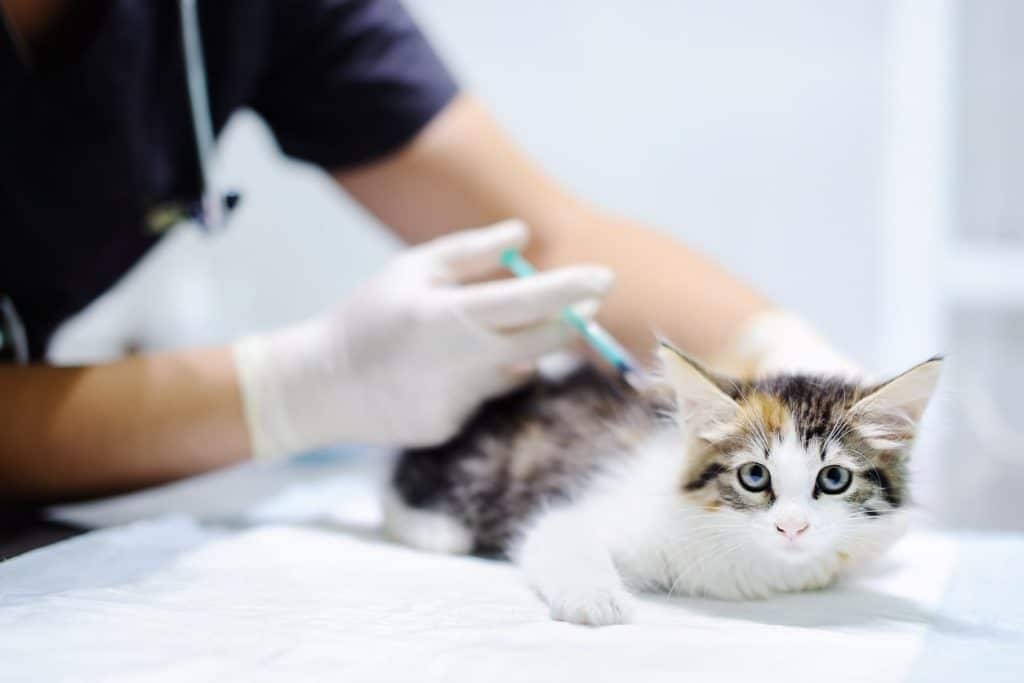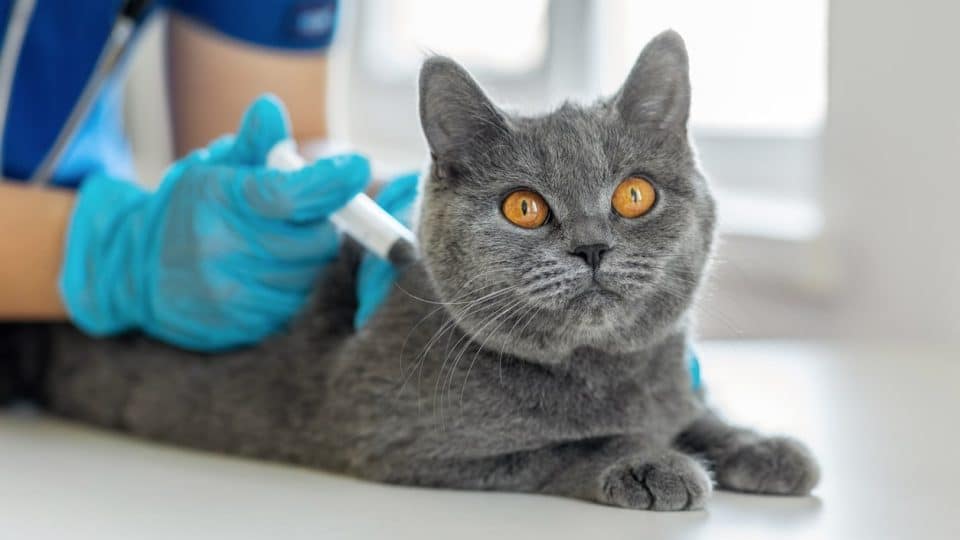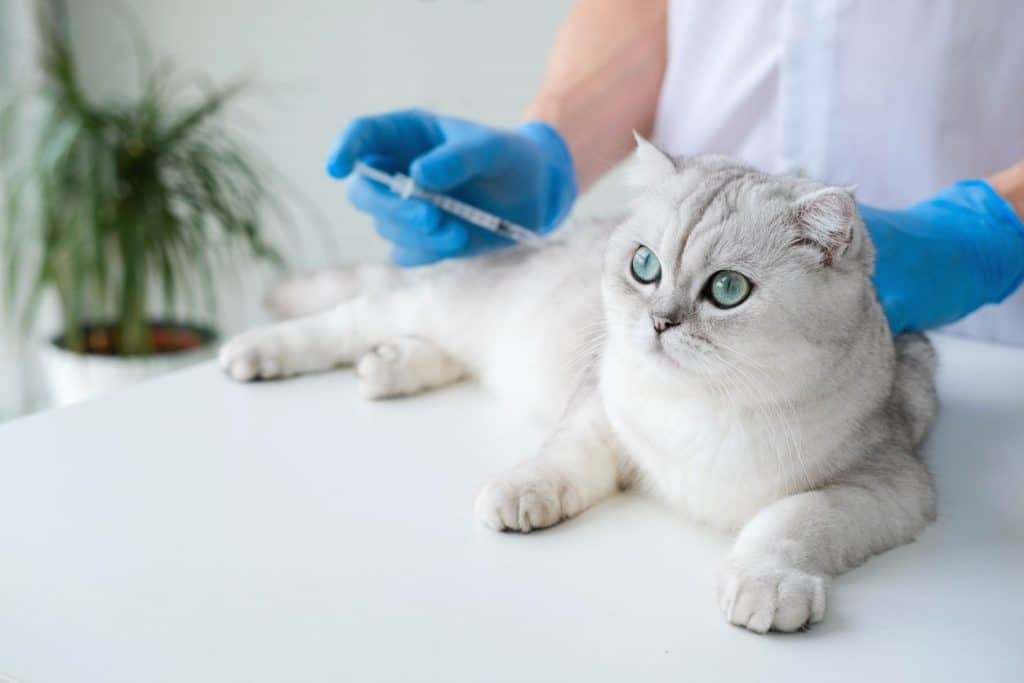When you bring home a new cat, they’ll probably need a round or two of shots. Not only do vaccines prevent your cat from catching common diseases, but they can also help to stop transmission to other cats and you.
Most cats will get the same two core vaccines: feline panleukopenia (FPV) and cat flu. If your cat goes outside or lives with other cats that do, they will also need to be vaccinated against feline leukaemia virus (FeLV).
However, every cat’s vaccination schedule varies. Additionally, some cats may need extra vaccines depending on factors such as their age, lifestyle, and any previous diseases they’ve been exposed to, says Dr Candy Akers, a holistic veterinarian.
Below, learn more about the vaccines your cat could need, when they’ll need them, and even how much you can expect to spend on vaccinations throughout your cat’s life.
Core Cat Vaccination Schedule: First Year
Every cat’s vaccination schedule will look slightly different, depending on factors like age and any non-core vaccinations they need.
But, generally speaking, all cats should ideally have their core vaccinations at around nine weeks old and then another at around 12 weeks old. These are:
- Feline panleukopenia (also known as feline parvovirus or infectious enteritis)
- Cat flu (this protects against calicivirus and feline herpes virus)
They should be protected against these diseases three to four weeks after their primary vaccination course is complete, but your vet will advise on this. Some cats may need three rounds of initial vaccines to be fully covered.
If your cat does or will go outside, or is in contact with other felines that do, they will also need to be protected against:
- Feline leukaemia virus (FeLV)
This vaccine is crucial, even if your cat only goes into your garden. The shot is usually given at the same time and intervals as the other core vaccinations.
Your cat will then need boosters annually. Some vaccinations cover your cat for up to three years. Your cat may also be offered other non-core vaccines, depending on lifestyle and health (more on that later).
Why Vaccines Are Important
Vaccines help ‘train’ your cat’s immune system to recognise diseases. If your cat’s immune system ever encounters infectious agents in the future, their body will produce antibodies or activate germ-killing cells to fend them off.
Dr Akers says that, ideally, vaccines should be administered when cats are still kittens. “This exposes their immune system to a disease before they go out into the world and encounter it,” she adds.
But if you’ve recently adopted a cat and aren’t sure of their vaccine status, experts recommend giving them the entire series of vaccines meant for kittens. If the cat is over 10 or has known health issues, Dr Akers says they’ll usually be given a “titer test”.
“A titer test measures the immune system’s strength that is already present in the bloodstream due to previous vaccines,” she explains. This will let the vet know if the cat needs vaccinations or boosters and help create a vaccine plan.
Which Vaccinations Does Your Cat Need? Every Shot Explained
Core vaccinations are essential for all cats, while non-core vaccinations are optional or only administered in certain circumstances.
iStock/Irina Tiumentseva
Panleukopenia
Panleukopenia (also known as feline parvovirus) is a contagious virus commonly affecting kittens. It can cause symptoms like appetite loss, vomiting, diarrhoea, and fevers. Severe cases can even lead to death. This vaccine is commonly administered in a combination vaccine, which mixes multiple core vaccines into a single shot.
Cat flu
This is a contiguous virus that causes severe upper respiratory infections in cats, much like flu in humans. It can cause a loss of appetite, eye and nasal discharge, conjunctivitis, mouth sores, and even lameness. Severe cases can cause inflammation in vital organs like the liver, pancreas, and intestines and eventual death. Cat flu can be caused by strains of calicivirus (FCV) and the herpes virus (FHV), as well as some bacteria. Most, but not all strains, are covered by the vaccine.
Feline leukaemia virus
Feline leukaemia virus (FeLV) is an infectious disease that causes symptoms like immune suppression, and anaemia and can eventually lead to cancer. It’s highly contagious and common in multi-cat environments. It affects between 1% and 2% of all cats in the UK and is a leading cause of virus-related death in cats. The FeLV vaccine is considered essential for all outdoor cats, or indoor cats who come into contact with them.
Non-core vaccinations
Not every cat will need the following non-core vaccines. But they could prove beneficial for certain cats when your vet recommends them.
- Rabies. Only needed for cats who travel outside of the UK. Rabies is a severe viral infection eradicated in the UK that commonly spreads through bites from infected animals. In cats, it can cause extreme behavioural changes, paralysis, and eventual death.
- Chlamydophila felis. A bacteria that can cause upper respiratory infections and conjunctivitis in cats. It’s only recommended for cats who have previously been exposed.
- Bordetella bronchiseptica (kennel cough). Highly contagious bacteria that cause upper respiratory infections in cats and dogs. It’s generally only recommended for cats from shelters or other multi-cat environments.
- Feline infectious peritonitis (FIP). A fatal viral disease caused by mutations of the feline coronavirus. However, research shows this vaccine isn’t always practical, and there’s little evidence that it can be transmitted from cat to cat. So, it’s not generally recommended.

iStock/SbytovaMN
How Much Does Each Round of Vaccination Cost?
Costs vary between vet practices and the type of vaccine given. But, generally speaking, a cat’s first year of vaccinations will generally cost around £100. Booster shots will generally cost £40 to £60 per year.
So, if your cat lives to be 15 years old, you can expect to spend £660 or more on vaccines throughout their lifetime—plus any consultation fees.
What if I can’t afford my cat’s vaccinations?
If you have difficulty affording the shots in your cat’s vaccination schedule from the vet, a low-cost pet vaccine clinic in your area might help.
Charities in the UK that provide low-cost vet care or support in certain areas include:
All in all, your cat may not enjoy getting their annual shots. But, following their vet-recommended vaccine schedule is essential to keep them and other cats safe from dangerous diseases.




